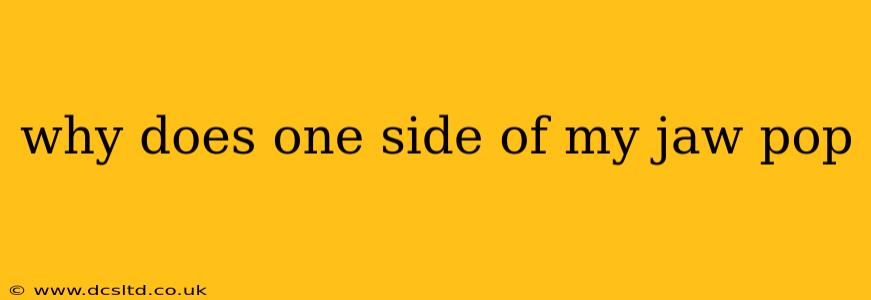Experiencing a popping sound in one side of your jaw can be concerning, but it's often a sign of a relatively common issue rather than something serious. Understanding the possible causes can help you determine if you need to seek professional medical attention. This article will explore the various reasons why your jaw might pop on one side, offering insights and guidance.
What Causes Jaw Popping on One Side?
The most frequent culprit behind a popping jaw is temporomandibular joint (TMJ) disorder. The TMJ is the joint connecting your jawbone to your skull, and it's a complex structure involving muscles, ligaments, and cartilage. When these components malfunction, various symptoms can arise, including popping, clicking, pain, and limited jaw movement.
Several factors can contribute to TMJ disorders leading to jaw popping:
- Dislocation of the articular disc: The articular disc is a cartilage cushion within the TMJ. If it's misaligned or displaced, it can cause a popping or clicking sound as your jaw moves.
- Ligament laxity: Loose or stretched ligaments surrounding the TMJ can allow for excessive movement, resulting in the jaw popping.
- Arthritis: Degenerative joint disease, such as osteoarthritis, can cause inflammation and changes in the joint surfaces, leading to popping.
- Muscle spasms: Overuse or stress can cause the muscles controlling jaw movement to spasm, potentially causing a popping sensation.
- Injury: A direct blow to the jaw or a whiplash injury can damage the TMJ and cause popping.
What Other Symptoms Might Accompany Jaw Popping?
While popping alone may not be a cause for immediate alarm, it's essential to pay attention to accompanying symptoms. These can help pinpoint the underlying cause:
- Pain: Pain in the jaw, ear, or temple is a common symptom associated with TMJ disorders.
- Limited jaw movement: Difficulty opening or closing your mouth fully.
- Headaches: TMJ problems can trigger headaches, particularly tension headaches.
- Earaches: Some people experience earaches or a feeling of fullness in the ear.
- Clicking: Similar to popping, a clicking sound can also indicate a TMJ issue.
- Facial pain: Pain radiating to the face or neck.
If you experience these symptoms in conjunction with jaw popping, it's crucial to consult a dentist or doctor specializing in TMJ disorders.
How is Jaw Popping Diagnosed?
A healthcare professional will typically conduct a thorough physical examination to diagnose the cause of your jaw popping. This may involve examining your jaw's range of motion, palpating the TMJ for tenderness, and assessing your bite. Imaging tests like X-rays or MRIs may be ordered to visualize the joint structures and rule out other conditions.
How is Jaw Popping Treated?
Treatment for jaw popping depends on the underlying cause and the severity of the symptoms. Options may include:
- Conservative treatments: These include pain relievers, muscle relaxants, ice or heat packs, and lifestyle modifications like stress management techniques and changes in diet (avoiding hard or chewy foods).
- Physical therapy: Exercises and stretches can help strengthen the jaw muscles and improve joint mobility.
- Splints or mouthguards: These devices can help realign the jaw and reduce stress on the TMJ.
- Surgery: Surgery is rarely necessary but may be considered in severe cases where conservative treatments have failed.
Is Jaw Popping on One Side Always Serious?
Not necessarily. In many instances, jaw popping on one side is a minor issue related to TMJ dysfunction. However, it's important to be aware of the potential underlying causes and seek professional help if the popping is accompanied by pain, limited jaw movement, or other concerning symptoms. Early diagnosis and treatment can often prevent more significant problems.
When Should I See a Doctor About My Popping Jaw?
You should seek medical attention if:
- The popping is accompanied by significant pain.
- You have difficulty opening or closing your mouth.
- You experience persistent headaches or earaches.
- Your jaw is locked or feels stiff.
- Your symptoms worsen over time.
Remember, this information is for general knowledge and does not constitute medical advice. Always consult with a qualified healthcare professional for diagnosis and treatment of any medical condition. They can assess your specific situation and recommend the best course of action.
